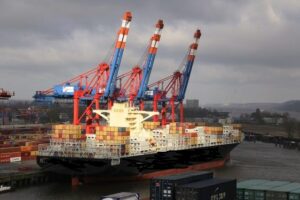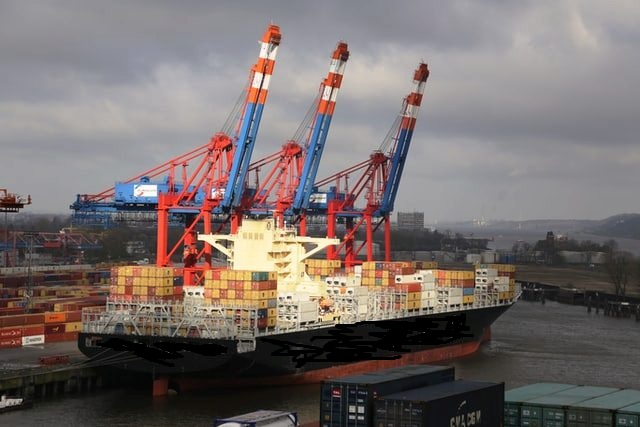-
Maritime trade to plunge 4.1% in 2020 due to COVID-19 economic impact
-
Sector could return to growth and expand by 4.8% in 2021, should world economy recover
-
Sector should brace for changes ranging from shifts in supply-chain design and globalization patterns to changes in consumption and spending habits
-
COVID-19 hit world trade after an already weak 2019, the year when volumes expanded by just 0.5% from 2.8% growth in 2018
 Global maritime trade will plunge by 4.1% in 2020 due to the unprecedented disruption caused by COVID-19, according to a new forecast from the United Nations Conference on Trade and Development (UNCTAD).
Global maritime trade will plunge by 4.1% in 2020 due to the unprecedented disruption caused by COVID-19, according to a new forecast from the United Nations Conference on Trade and Development (UNCTAD).
UNCTAD’s “Review of Maritime Transport 2020” expects maritime trade growth to return to positive territory and expand by 4.8% in 2021, but only if the world economic output recovers.
A steeper decline could happen if new waves of the pandemic arrive to further disrupt supply chains and economies, it warned.
“The pandemic has sent shockwaves through supply chains, shipping networks and ports, leading to plummeting cargo volumes and foiling growth prospects,” the report, released on November 12, said.
“The short-term outlook for maritime trade is grim. Predicting the pandemic’s longer-term impact as well as the timing and scale of the industry’s recovery is fraught with uncertainty.”
Moreover, the maritime transport industry will need to brace for change and be well prepared for a transformed post-COVID-19 world, it said.
“The COVID-19 pandemic has underscored the global interdependency of nations and set in motion new trends that will reshape the maritime transport landscape,” it expounded.
The sector faces not only immediate concerns resulting from the pandemic but also longer term considerations. These range from shifts in supply-chain design and globalization patterns to changes in consumption and spending habits, a growing focus on risk assessment and resilience-building, as well as a heightened global sustainability and low-carbon agenda.
The sector is also dealing with the knock-on effects of growing trade protectionism and inward-looking policies.
The pandemic has also underscored the importance of maritime transport as an essential sector for the continued delivery of critical supplies and global trade in time of crisis, during the recovery stage and when resuming normality.
UNCTAD underscored the need for ships to meet international requirements, including sanitary restrictions, and for ports to remain open for shipping and intermodal transport operations.
2019 volumes already weak
COVID-19 hit world trade after an already weak 2019, during which global maritime trade lost further momentum as trade tensions continued to bite.
These undermining factors included China-US tensions, uncertainties around Brexit, complaints made by several countries against Indian tariffs, the Japan-Korea trade dispute and general moves towards protectionism.
Volumes expanded by 0.5% in 2019, down from 2.8% in 2018, and reached 11.08 billion tons last year.
In tandem, global container port traffic decelerated to 2% growth, down from 5.1% in 2018.
“The pandemic brought into sharp focus the topic of supply chain shortening, including nearshoring and reshoring, with less dependence on just-in-time and lean inventory models,” the report stated.
COVID-19 has also brought to the fore the debate over diversifying production and manufacturing sites and suppliers, it added.
The pandemic has also exposed how unprepared the world seemed to be in the face of such a crisis, the report observed, underscoring the urgent need to invest in risk management and emergency response preparedness in transport and logistics.
It said future-proofing the maritime supply chain and managing risks requires greater visibility and agility of door-to-door transport operations.
It said the pandemic should not push to the back burner action to combat climate change in shipping. Therefore, post-COVID-19 recovery policies should support further progress towards green solutions and sustainability.
“The momentum of current efforts to address carbon emissions from shipping and the ongoing energy transition away from fossil fuels should be maintained,” the paper said.
The pandemic has also strengthened the case for digitalization and eliminating paperwork in the shipping industry, including in ports, the report observed, reinforcing the need for standards and interoperability in electronic documentation.
The report decried the humanitarian and safety crisis caused by the pandemic, when more than 300,000 seafarers were stranded at sea for months beyond the end of their contracts.
UNCTAD reiterated its call to authorities to designate seafarers as key workers exempted from COVID-19 travel restrictions.
Photo by Bernd Dittrich on Unsplash





